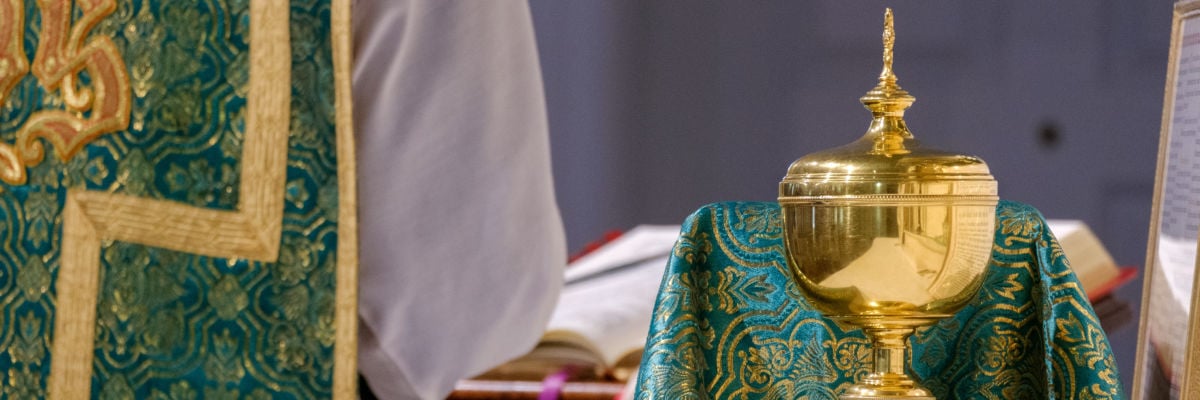
The Church’s choices in today’s lectionary could not be much clearer in its highlight on the nature of the Eucharist. That trend continues next week when we get yet more from John 6, and of course we know the famous verse from that same chapter: “He that eateth my flesh and drinketh my blood dwelleth in me and I in him, saith the Lord.”
Let’s be clear: this pairing of the manna in the wilderness from Exodus with the bread of life discourse in John is not merely the arbitrary whim of theologians and liturgists. It is a comparison brought up directly by the crowd in John and echoed again by Jesus himself. They, and he, knew exactly what they were doing in making this comparison. It wasn’t random.
Consider the central message of the Exodus. God rescues his people from slavery in a dramatic series of actions: the ten plagues, the Passover, the crossing of the Red Sea on dry land. Then, just at the moment when God offers them a more permanent arrangement, they get impatient—basically because Moses is spending too much time on Mount Sinai—and make a golden calf to replace him. And then, after they repent and get on their way again, they start complaining about food and water. And God provides. Abundantly. He gives them exactly what they need. More than they need, really. The manna in the wilderness isn’t just a strange incident of Jewish history. For Jesus it is a powerful sign—one repeated again in the Our Father, with the mention of “daily bread”—of God’s providence and provision.
Remember, just last week we heard about the feeding of the five thousand from just a few loaves and fish. John seems intent on showing us this point: all of the ways that God has provided for his people, all of the ways that he gives them what they need, all of these are summed up in this one person. He is the bread. He’s also the fish, and the quail—the flesh, the meat, even the blood, which is to say the life. As the psalm says, “the eyes of all wait upon thee, O Lord, and thou givest them their meat in due season. Thou openest wide thine hand, and fillest all things living with plenteousness.”
Some of you will remember the well-publicized survey results suggesting that well over half of self-identifying Catholics think that the Eucharist is “merely a symbol.” Our Lord’s comments about his flesh and blood in John 6 remain as difficult now as they did two thousand years ago.
What we believe, as Catholics, is a precise and unusual thing: that the bread and the wine offered at the altar do not change in appearance or in physical reality, but on the level of substance or nature. So the Lord we worship and adore is present in reality, but not in appearance. As St. Thomas Aquinas writes in his hymn, “Faith, our outward sense befriending, makes our inward vision clear.” The point is that our outward senses do not, and indeed cannot perceive the reality. But with faith, our physical senses can be, in that wonderful phrase, “befriended,” which is to say that we can make that leap across the gap in perception to another kind of knowledge that relies not on the senses, but on the intellectual realities made certain by divine teaching. We can, in other words, both see and not see at the same time.
As a relatively new priest, this point rings home to me. Unlike an old priest who has been saying Mass for decades, the newness of the ritual action itself is often, to be honest, a barrier to that inward sight. It is so easy to be focused on getting it right, not messing it up, that I fail to find that inner peace and knowledge of the Lord’s own real presence on the altar, which is in some miraculous, hidden way brought about through my hands. I might know on a rational, intellectual level what is happening. But my outward senses are not necessarily, as St. Thomas says, “befriended.”
How do we make it more real? That’s not quite right, of course, because the reality just is. How do we make it feel more real? Surely this is not just a problem for a newbie priest, but a problem that most Catholics will encounter at some point in their lives.
If we know and believe the gravity of the Eucharist, how do we more fully internalize that seriousness?
The first way is exactly what we might call the superficial way. That’s not the right way to put it, but it’s also true, at least in the sense that we know that ultimately, the truth of the Mass does not depend in any absolute way on the particular manner in which it is celebrated, the ritual and ceremonial aspects that surround it, etc.
A Mass celebrated in a makeshift location, whether at someone’s deathbed or in a tent, is no less the Holy Sacrifice than a Pontifical High Mass at the most glorious cathedral with the most glorious choir and the most highly trained and excellent servers and acolytes in all Christendom. And it is certainly the case that in a particular situation, the simple one might be that much more impactful in meaning to us than the one with all the smells and bells and damask and musical profundity. Yet it is also the case that we are human and that our senses need a little more befriending than the pure intellect can provide. That is why, even though we have, in a certain sense, everything we need even in a tent Mass, we do look for more. We want a building. We want an organ. We want all the external things that can assist us in raising our spirits to God. It is not mere vanity to want these things; it is in a way both a realization of our human weakness and at the same time a realization of God’s incredible graciousness and the way that he is able to work through the whole of our sense experience to recognize his goodness and share it with the world.
The second way to more fully internalize the reality of the Eucharist is to embrace the eucharistic shape of life outside the Mass.
Sometimes Catholics are so focused on the doctrinal content of the Mass that they dismiss the more mundane qualities of the Eucharist as merely symbolic and therefore not important. But the fact that bread and wine become body and blood does not evacuate the symbolism of bread and wine as emblems of human flourishing. In the Eucharist, a very human activity—eating—is transformed into something extraordinary. And the uniqueness of the eucharistic sacrifice needn’t distract us from what this says about ordinary human activity: that it is always, whether we recognize it or not, oriented to fellowship with God.
This should not surprise us. It is what we were made for. But we if pay attention to the Eucharist, we can begin to notice the eucharistic shape of human life in general. We weren’t created just to eat and drink, just for the sake of basic physical survival. We were created for fellowship with God, and one another.
I submit then that the experience of Mass is enhanced not by treating it as something radically different from all other human activities, but rather by treating it as the form that shows the true meaning of all those activities. In the Mass, we see the meaning of eating and drinking, the meaning of love and marriage, the meaning of friendship and compassion. And if we can see these things in the Eucharist, we can see the Eucharist in these things as well, and these things can be, through our participation in the Eucharist, transformed into further means of grace and fellowship with God. Amen.



